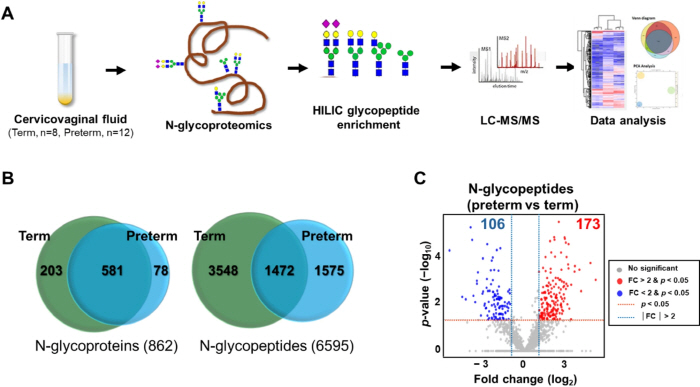Prediction of premature birth with cervical vaginal fluid...Discovering New Biomarkers
Apr 08, 2025
|
Professor Kim Young-joo's team discovered three poly-sialylated glycans with high preterm predictions through an analysis of N-glycosylation in the cervical vaginal fluid of full-term and preterm pregnant women through the analysis of N-glycosylation in the cervical vaginal fluid of preterm pregnant women. The research paper was published in the April issue of the Internet edition of the SCI-level international journal 『Scientific Reports』.
Professor Kim Young-joo's team hypothesized that the site-specific N-binding glycosylation of proteins in the cervical vaginal fluid as a biomarker for predicting premature birth would appear differently in the full term and preterm birth groups and conducted a comparative analysis.
As a result, a total of 6595 N-binding glycopeptides were analyzed, of which 173 glycans in the preterm group were significantly increased compared to the full term group, and low levels of fucosylation and high levels of sialylated glycans were characterized. Among them, we found three polysialylated glycans expressed in all samples regardless of microbiome composition in vaginal fluid and showed high preterm birth predictions (AUC = 0.802, p<0.017). In addition, it was confirmed that the accuracy of preterm birth prediction increased when used in combination with clinical indicators such as body mass index or maternal age.
The cervical vaginal fluid is a mixture of functional proteins in various glycan structures, and the glycosylation expression of this glycoprotein is known to play an important role in host-pathogen recognition, immune response, cell signaling, and pregnancy status. However, there have been few clear findings on the predictability of premature birth.
Professor Kim Young-joo said that poly-sialylated glycans in cervical vaginal fluid have potential value as a new clinical marker for predicting premature birth during pregnancyThrough this study, we presented a new predictive biomarker development strategy using cervical vaginal glycans to detect preterm birth.
Meanwhile, Professor Kim Young-joo has received a project from the Korea-UK Global Research Cooperation Support Project of the Korea-UK Health Industry Promotion Agency from 2023 to discover preterm birth prediction markers based on AI analysis in multiracial clinical samples, and has published a number of domestic patent registrations and papers.
|
This article was translated by Naver AI translator.















